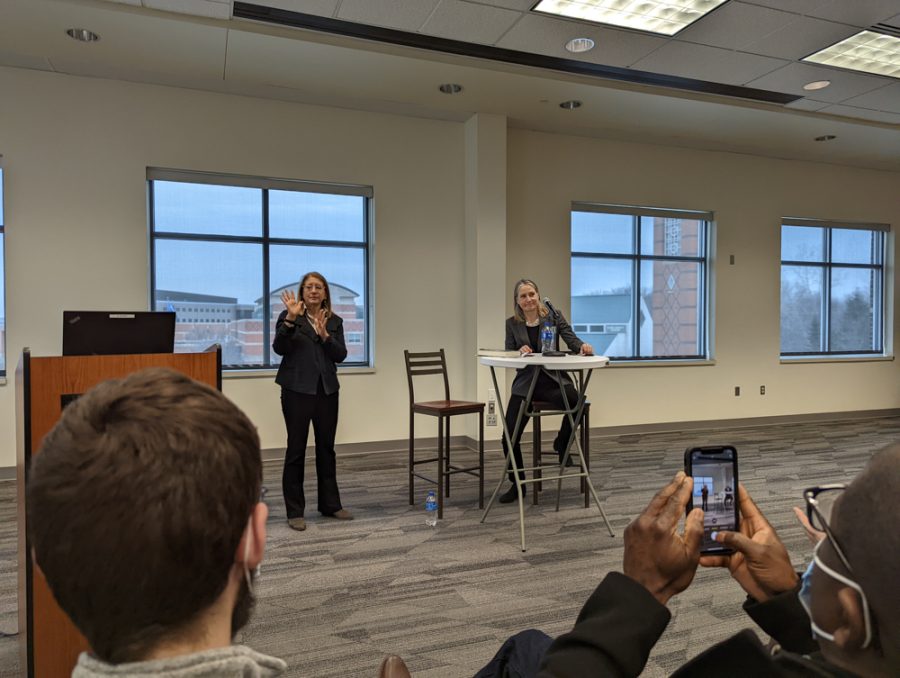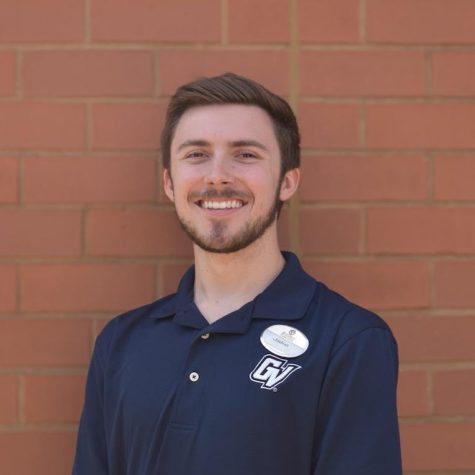Fiona Hill visits GV to discuss Russia, Ukraine conflict
Mar 14, 2022
On March 1, Grand Valley State University welcomed former U.S. National Security Council official and current Brookings Institution Senior Fellow Dr. Fiona Hill to participate in a discussion about the conflict between Russia and Ukraine. Throughout the hour-long chat between Hill and Professor Polly Diven, topics like Hill’s experience as a graduate student in the Soviet Union, Vladimir Putin’s rationale for invading Ukraine and the likelihood of direct U.S involvement in the conflict were covered.
With the Pere Marquette room full of attendees, Hill began the discussion by recounting the experiences that lead to her receiving a full-ride scholarship to Harvard University. Born in northeast England, Hill is the daughter of a coal miner and was the first person in her family to attend college.
While she was completing high school and college, Hill lived through the Euromissile Crisis, which was a nuclear standoff between the Soviet Union and several Western nations.
“We actually thought there was a real risk of a miscalculation, and in November of 1983, we came very close to nuclear war because the Soviets, at the time, misread a series of U.S. exercises,” Hill said. “They thought the exercises were preparation for an offensive, maybe even the first strike against the Soviet Union.”
This experience, as well as other world events related to the threat of nuclear war and U.S. and Russian conflicts, inspired Hill to study Russian and modern history at Harvard. She eventually became a foreign exchange student and chose to study in Moscow, where she witnessed former Russian president Mikhail Gorbachev and former U.S. president Ronald Reagan sign the Intermediate-Range Nuclear Forces Treaty. That treaty effectively ended the Euromissile Crisis, but the standoffish attitude between Russia and the U.S. persisted.
After finishing the story of her educational journey, Hill spoke about similarities between the tense atmosphere of those years compared to today.
“We’ve come full circle and those circles keep expanding out,” Hill said. “The same things I was worried about back in 1984 are the same things that we’re all worried about now.”
On the subject of the current Russian invasion of Ukraine, Hill echoed sentiments from other Russian experts and said a full-scale invasion was the worst case scenario. She said there were plenty of other ways Russia could have escalated the situation that wouldn’t have involved invading Ukraine.
“Like other people, I was hoping that this wouldn’t be the option that Vladimir Putin chose,” Hill said. “Putin had created for himself a whole range of options to choose from.”
Although Putin had prepared for many different militaristic situations, Hill said, he didn’t expect such a massive support system to rise up behind Ukraine.
“That was a massive miscalculation in many respects because he thought, going back to 2014 and what happened in Crimea, that Russian speakers in Ukraine would be sympathetic towards Russia and would rise up,” Hill said.
Although he probably foresaw fierce resistance from Ukrainians and their military, worldwide condemnation and massive sanctions on Russia’s economy from most of its trade partners were something Putin didn’t see coming. Because of this mistake, Ukraine and the rest of the world appears to be putting up much fiercer resistance than Putin and the Russian army expected.
“Did he expect people like you to be signing letters of support, or people sending goods and supplies to Ukraine?” Hill said. “He wouldn’t have expected that, and I certainly didn’t expect the German government to turn around and put 2% of their GDP into support for NATO into their budget or to stop the Nordstream 2 pipeline.”
Hill moved on to Putin’s rationale for invading Ukraine, which comes down to his belief that the country is rightfully still part of Russia. She also said NATO expansion played a part in Putin’s decision to invade at this point in time. Countries like Ukraine and Georgia, which both border Russia, were on track to join the pact in the near future and Putin is not fond of having a powerful Western alliance so close to Russia.
Aside from those reasons, Hill said Putin has one other reason for justifying the invasion: he believes Russia always has a target on its back.
“This is basically the idea that Russia is always under assault,” Hill said. “If you look at all of his speeches, they go back to the 17th century Polish Lithuanian Commonwealth that got all the way to Moscow, the Russian National Day is actually the day of basically pushing the Poles out of Moscow.”
Hill explained that Putin sees any expansion of NATO, or really anything that looks like a military entity, closer to Russia as a huge red flag and a threat to the country. In Putin’s mind, Ukraine and Georgia deciding they wanted to join NATO was about as big of a red flag as there could be.
“We thought very much that then the Russians would launch some kind of pre-emptive action against this, and we saw that in Georgia in 2008 when the Russians went full-in on it,” Hill said. “We thought that they’d do it in Ukraine too but the Ukrainians pulled back from NATO.”
At the end of the event, Hill took questions from the audience. The first question Hill received from a student was about the differences between this conflict and the 2014 annexation of Crimea.
“I’m sure Vladimir Putin is wondering the same thing,” Hill said.
She went on to explain that Crimea is full of native Russian speakers, plenty of which were sympathetic to the idea of being under Russian rule for various reasons. As a result, Putin and Russia moved in and took control of the area with relative ease. Those who supported Russia’s justification stayed in Crimea and most of those who opposed moved to other parts of Ukraine.
“The Russian government thought that they could pull this off again in the Donbass region and maybe all the way down to Odessa,” Hill said. “They thought that all of these Russian-speaking cities around the coast would rise up as well, but that didn’t happen, and in fact, people pushed back.”
Another student asked about the U.S.’s response so far and if President Biden’s opposition to sending in American troops was the right approach.
“Putin is absolutely paranoid about NATO intervention, that’s why he’s put his nuclear forces on high alert, to scare off NATO because believe me, he’d figure out some way of using some kind of nuclear weapon,” Hill said. “The whole idea is to scare the hell out of all of us, get us to back off so that he can continue.”
As Hill covered earlier in the discussion, Putin still believes Ukraine rightfully belongs to Russia, so the last question of the event asked if he’d have invaded Ukraine even without the possibility of the country joining NATO.
Hill’s answer touched on the fact that Russian citizens are encased in a propaganda barrage that accuses Ukraine of being infiltrated by neo-nazi nationalists and other outsiders. In Russia, Putin is using those blatantly false accusations as justification for the invasion and spreading that message across as many media channels as possible.
“People in Russia only thought some action was justified because they thought this was about the United States trying to take over Ukraine or NATO trying to take over Ukraine,” Hill said. “Only Vladimir Putin made that decision to invade and only he and the people around him knew that he was going to launch a full-scale invasion.”
A few days after the event, Diven shared her favorite parts of the event.
“I loved the fact that students and faculty had a chance to ask many good questions,” Diven said. “I was also happy to hear Dr. Hill discuss her modest beginnings and emphasize how students at GVSU can go on to do great things too.”
She also highlighted the incredible timing of the event. The planning process began in the fall 2021 semester, so it was completely coincidental that Hill ended up speaking during the middle of the conflict.
“The timing could not have been better, Dr. Hill helped us all make more sense of the tragic events unfolding in Ukraine,” Diven said. “She has met with Putin on several occasions and helped us understand his mindset. She also clearly differentiated between blaming Putin and his cronies while not blaming the ordinary citizens of Russia.”
More information about Hill and her experiences with Russia and Ukraine can be found in her new book, “There is Nothing for You Here”.
























